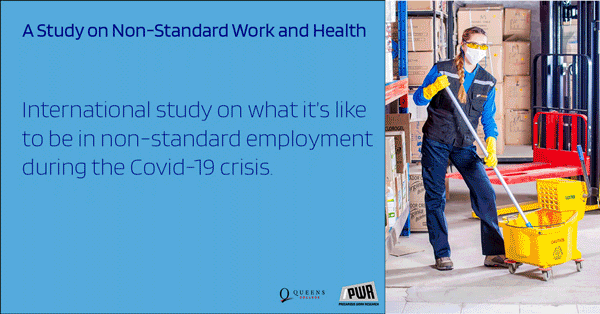Precarious Work Research
Join Our Study!
The ever-changing social and economic environment, technological shifts and the ongoing crisis due to the Covid-19 virus outbreak is likely to affect workers with non-standard employment arrangements (NSEA) the most. There are significant research challenges related to evaluating the consequences of these employment arrangements, especially during times of crisis, that this research program aims to address.

Study Goals
This study is one component of a larger study centered at the Karolinska Institute and funded by FORTE: the Swedish Research Council for Health, Working Life and Welfare. It includes data collection by partners in Sweden, Belgium, Spain, Canada, United States and Chile. The overall purpose of this research program is to:
1.Deepen the understanding of how NSEA (non-standard employment arrangements) affect individuals and their families and how these contribute to inequalities in the work environment, health and well-being.
2.Identify initiatives that counteract the negative effects of NSEA and increase the ability of workers to participate, exercise empowerment, and live healthy lives.
Our Team

Dr. Sherry Baron is a Professor at the Barry Commoner Center for Health and the Environment and the Urban Studies Department at Queens College, and an affiliate Professor at the Graduate School of Public Health and Health Policy, City University of New York. She is funded by the CDC and by NIH to conducted community-engaged research to investigate the role of employment in health, with a focus on workers who are immigrants and employed in low wage and nonstandard work arrangements. Prior to coming to CUNY in 2014, she spent 25 years as a medical epidemiologist at the National Institute for Occupational Safety and Health. CDC.

Dr. Isabel Cuervo is a Senior Research Associate at the Barry Commoner Center for Health and the Environment at Queens College, City University of New York. She leads bilingual, inter-institutional community-engaged research, evaluation, and service projects focused on Latinx immigrant workers’ health. Dr. Cuervo was trained in Environmental Psychology at the CUNY Graduate Center and specializes in qualitative methodologies. Dr. Cuervo’s theoretical foundations encompass how personal, social, and physical contexts are integral to people’s behaviors, thoughts, and attitudes. She has additional research experience in the fields of housing, urban planning, and education.

Dr. Emily Ahonen is an Associate Professor of Public Health in the Department of Social and Behavioral Sciences at Indiana University (IU). She is also a Faculty Research Fellow in the Center for Health Policy, Fairbanks School of Public Health, IU. She received a PhD in Public Health and an MPH degree in Community and International Health, both from the Universitat Pompeu Fabra in Barcelona, Catalonia, Spain. Dr. Ahonen’s research explores linkages among work, living conditions, and social category, and their ties to broader economic and political circumstances which distribute the quality of work and living conditions across groups, thus impeding or facilitating the achievement of health equity in populations. She also evaluates interventions, both to understand processes and to demonstrate outcomes in a variety of public health challenges.

Dr. Letitia Davis is an occupational epidemiologist with over 35 years developing systems for tracking work-related injuries and illnesses primarily as director of the Occupational Health Surveillance Program in the Massachusetts Department of Public Health (MPDH). Much of her work has focused on identifying needs of more vulnerable worker populations. She has also played regional and national leadership roles in the effort to integrate occupational health into public health practice at the state level. Since her retirement from MPDH in 2019, Dr. Davis continues to collaborate with other researchers and state occupational epidemiologists and advises unions and community organizations on occupational safety and health issues. She is currently involved in a national effort to develop an approach to collecting information needed to characterize work-related COVID-19 cases at the state and national level

Emma Vignola is a PhD student in the Department of Community Health and Social Sciences at the City University of New York (CUNY) Graduate School of Public Health and Health Policy. She is also a Research Assistant at the Barry Commoner Center for Health and the Environment at Queens College and a Research Fellow at the CUNY Urban Food Policy Institute. She received an MSPH in International Health with a concentration in epidemiology from Johns Hopkins School of Public Health. She has worked in the US and internationally in research related to child development and in program implementation related to health workforce training. Her research interests include comparative approaches in urban health, critical theory, and political determinants of health inequities, particularly work-related health inequities.
